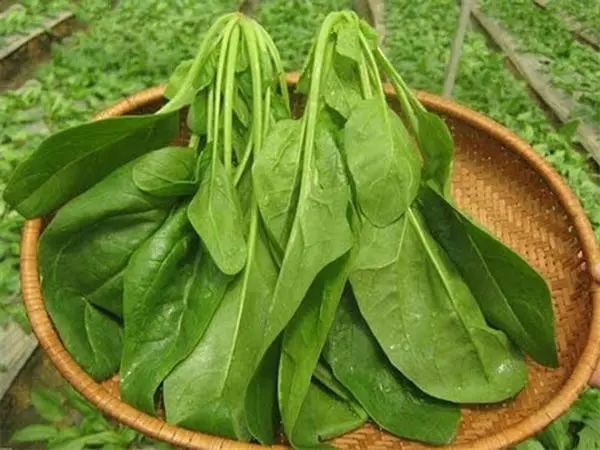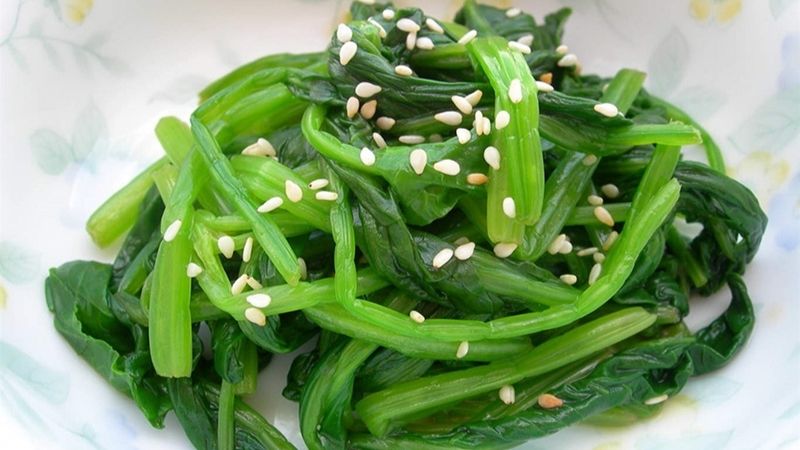Kale, also known as duckweed cabbage and sea kale, is a familiar nutritional choice on many families’ dining tables. It is easy to prepare into various dishes, kale is not only rich in flavors but also a abundant source of essential nutrients for daily intake. Popular in Vietnamese markets and supermarkets, this “superfood” is ready to supplement your menu.
With 91.9% water content, kale is also rich in fiber, vitamins C, K, protein, and healthy fats. Each 100g of kale contains 2.2g of fiber, 2.86g of protein, and an impressive amount of vitamin C and K, which contribute significantly to maintaining health and preventing diseases. Many people prefer this vegetable not only because of its high nutritional value but also its ability to reduce the risk of dangerous diseases.
Boosts cardiovascular health
Everyone desires to have a healthy heart that does not decline over time. One of the secrets to protecting the heart is to follow a balanced and scientific diet. Kale, with its high inorganic nitrate content, has been proven to support cardiovascular health, reduce the risk of heart diseases. Not only helps to improve heart function, kale also helps to lower blood pressure and increase the elasticity of blood vessels.
Vitamin K and omega-3 fatty acids in kale are also valuable nutrients that help strengthen cardiovascular health. For this reason, kale becomes an ideal choice for all ages in maintaining a healthy heart.

Blood sugar regulation
Kale is not only a nutritious vegetable, but it also contains alpha-lipoic acid (ALA), an antioxidant that improves glucose storage in the body. This helps kale become an important part of blood sugar control, minimizing the risk of sudden blood sugar spikes – a factor that can be harmful to overall health.
In addition, folic acid in kale also plays an important role in increasing sensitivity to insulin. This is beneficial in preventing and managing diabetes. Therefore, kale not only enriches meals but also actively supports blood sugar control, protecting the body from the risk of diabetes.
Cancer prevention food
Kale, known as the “King of All Vegetables,” is not only famous for its high nutritional value but also known for its cancer prevention properties. Flavonoids in kale play a crucial role in anti-inflammatory and inhibiting the growth of cancer cells, especially prostate cancer.
Scientific research also shows that vitamin B and other vitamins in kale are effective in enhancing overall human health. Another notable advantage of vitamin B is its ability to protect the skin from the harmful effects of UV rays, thereby reducing the risk of skin cancer.

An aid to prevent anemia
Kale is not only a “Superfood” with complete nutrients but also a rich source of iron, helping prevent anemia, a common health problem. Especially for pregnant women, kale is recommended as part of their diet for the ability to provide natural iron without the need for supplements.
However, excessive consumption of kale to increase iron levels may not have the expected results. The presence of oxalates in kale can hinder the absorption of iron in the body. Therefore, to maximize the benefits of consuming kale, it is advisable to apply it scientifically and moderately, in combination with other nutritional methods to optimize iron absorption and other nutrients.

A miracle for bright and healthy eyes
Kale is a rich source of lutein and zeaxanthin, two important antioxidants for eye health. In addition, the abundant amount of vitamin C and vitamin A in this vegetable acts as a natural “medicine” for the eyes, helping to avoid the risk of eye-related diseases such as cataracts.
Speedy wound recovery
Kale is also known for its ability to support wound healing. Vitamin C in kale helps the body produce collagen, an important factor in the healing process of wounds, thereby enhancing healing ability and quick recovery. The presence of kale in daily diet not only helps strengthen health but also is part of a treatment support therapy, preferred by many people in Vietnam’s culinary habits.
































